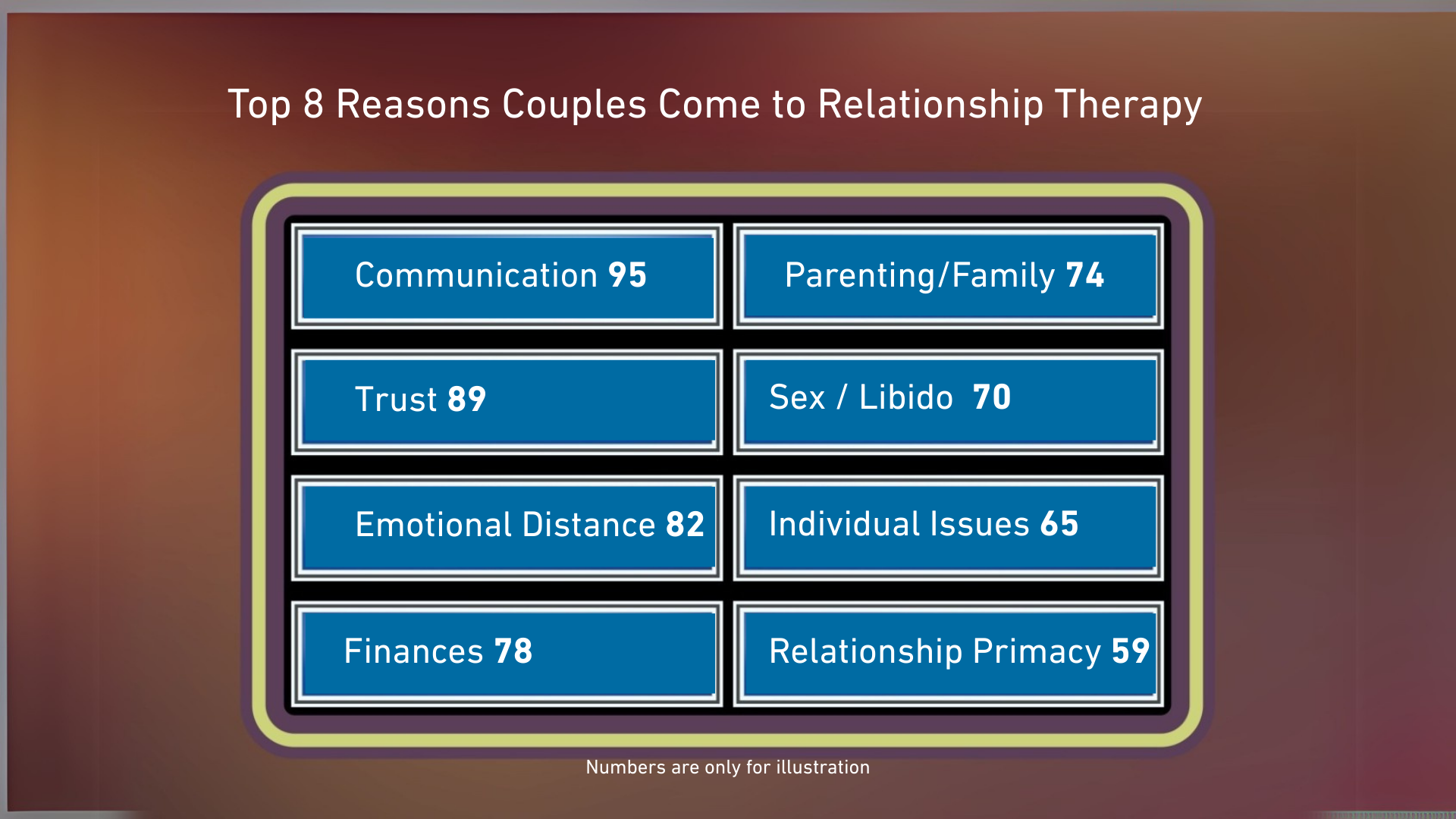Bridging the Communication Gap
“Why do we keep having the same argument?”—it’s a question I hear from couples regularly at Relate. Often, both partners truly think they’re communicating clearly. Yet somehow, the message gets lost in translation and triggers friction. Effective communication isn’t just about speaking; it’s about truly listening, staying self-aware, and aligning your words and tone with your intentions.
This blog explores common reasons why we miss each other’s meaning, highlights the importance of daily efforts and provides practical tips to help you communicate more effectively. After all, real conversations build emotional intimacy, while misunderstandings can create a slow drift apart. Let’s ensure you head in the right direction.
Recognising the Disconnect: Why We Miss What’s Being Said
The “Autopilot” Problem
It’s easy to slip into autopilot when life gets busy—jobs, kids, or deadlines swirl in your mind. You might ask your partner a question while scrolling your phone, or say “Uh-huh” without really absorbing their words.
What happens? Your partner perceives disinterest or half-hearted engagement, and tension silently brews.
Emotional Filters
Our past experiences or current mood can colour how we interpret our partner’s words. If you’re feeling insecure or stressed, you might hear innocent feedback as criticism.
Example: Your partner says, “Is dinner almost ready?” You may interpret it as, “You’re taking too long,” rather than a genuine question.
Different Communication Styles
Everyone has a unique style—some prefer directness, others need gentler phrasing. Without awareness, messages can come across as harsh or vague, leading to misinterpretation.
Key Takeaway: The first step in effective communication is acknowledging your own mental state, emotional filters, and default style, so you can adjust accordingly.
Staying Self-Aware: A Skill for Better Communication
Self-awareness is the lens that clarifies what you’re projecting and how you’re receiving messages. When tension surfaces, it often means we’ve lost track of how we’re feeling or what triggers us.
The Art of “Pressing Pause”
Relationship primacy is a concept of prioritising the relationship. Show up consistently with curiosity and kindness. A big part of that is learning to pause before reacting.
-
Notice your physical cues: Is your heart racing? Are your shoulders tense?
-
Ask yourself: “Am I hearing what they’re actually saying, or am I filtering it through my current stress?”
-
If needed: Suggest a short break to recalibrate before continuing.
Why it matters: Pressing pause stops escalation and allows time for self-check, so you can respond rather than react.
Owning Your Emotional Baggage
We all bring past hurts and anxieties into conversations. For example, if you once felt dismissed by a parent or ex-partner, you might become extra sensitive to certain tones or phrasing.
Action Step: When you feel triggered, identify it: “I know I can be sensitive about criticism because of past experiences. Let me clarify what you meant instead of assuming.”
Daily Consistency In Communication Counts
Grand gestures don’t outweigh regular small moments of attention. In communication, this means:
-
Consistent Eye Contact—Even 60 seconds of undivided attention can be more powerful than an occasional big “date night.”
-
Frequent Check-Ins—A daily “How are you feeling?” fosters a sense of safety.
-
Mindful Listening—Avoid half-listening while multitasking.
Remember: Communication success hinges on the trust and goodwill you build day by day. If your partner consistently sees you tune in, they’re more inclined to share openly, deepening your bond.
Tips and Techniques for Effective Communication
Active Listening: The Key to Feeling Understood
Most people talk about “active listening,” but how do you do it effectively?
-
Maintain eye contact—signals genuine interest.
-
Reflect back—“So you’re saying the office workload is overwhelming?”
-
Validate feelings—“That makes sense; you’ve got so many deadlines.”
-
Invite correction—“Did I understand you correctly?”
Why it works: It confirms that you’re not just hearing words but internalising the emotional content.
Use Neutral Language in Sensitive Topics
When issues arise—finances, in-laws, or chores—your partner might easily feel attacked if language is harsh.
-
Instead of: “Why are you always overspending?”
-
Try: “I’m worried about our budget. Can we talk about how to manage expenses?”
Key: Avoid absolute terms like always or never, which can trigger defensiveness.
Ask Clarifying Questions
If something’s unclear, don’t assume. A polite question can prevent huge misunderstandings.
-
“When you said ‘Let’s not invite your friends over so often,’ did you mean just this weekend or in general?”
Benefit: Clarifying fosters cooperation and nips resentment in the bud.
Watch Your Non-Verbal Cues
Communication is more than words—it’s tone, posture, and facial expression. Crossing arms or rolling eyes can undermine whatever you’re saying.
-
Tip: Keep an open posture, lean in slightly, and nod to show engagement.
Remember: Non-verbal signals can either amplify or contradict your message.
Common Reasons We Dismiss or Mishear Our Partner
Ego and Pride
Sometimes we’re so set on being “right” that we dismiss any viewpoint that challenges ours. This can lead to stonewalling or arguments where nobody feels heard.
Time Pressures
Modern life can be hectic. Multitasking can degrade meaningful conversation—like trying to talk finances while cooking dinner, texting friends, and wrangling kids.
Fear of Conflict
Some individuals avoid certain topics, afraid an argument might erupt. This often leads to bottled up issues that later explode.
Tip: Approach tough topics early, in a calm environment, to handle them before tension builds.
Self-Awareness Exercises for Better Communication
The “Mood Check” Before You Speak
Take 10 seconds to note your emotional state—happy, stressed, sad, or irritable—before initiating a conversation. If you’re feeling unstable, consider cooling down or clarifying your mood: “I’m a bit tense, but let’s talk calmly.”
Journaling
A quick daily note on how interactions went can highlight patterns—like repetitive misunderstandings. Over time, you’ll see if the issue is your approach, timing, or something deeper.
Apologise Quickly
When you do snap or misinterpret, own it swiftly: “I’m sorry; I see I took that the wrong way. Let’s try again.” Short-circuiting defensiveness keeps negativity from spiralling.
When More Help is Needed
Joining Relate’s School of Love
Sometimes, simply reading tips or watching videos isn’t enough. If you want a comprehensive approach to mastering communication skills, check out Relate’s School of Love. Our step-by-step courses cover everything from empathetic listening to conflict resolution. It’s like having a personal roadmap for building a more fulfilling relationship.
Seeking Professional Support
If you notice deeper issues—old wounds, betrayals, constant negativity—relationship therapy can help. The Relate Team Members offer personalised guidance to:
-
Identify root communication problems
-
Develop strategies for long-term changes
-
Create a safe space to voice concerns and feel heard
Key Insight: Therapy is not a sign of failure; it’s an investment in the health of your partnership.
Practical Communication “Do’s and Don’ts”
Do:
-
Use “I” statements: “I feel worried when we don’t talk after work.”
-
Ask for feedback: “Am I explaining this clearly?”
-
Stay curious: “Tell me more about what you’re feeling.”
Don’t:
-
Interrupt: Let them finish their sentence before responding.
-
Generalise: Avoid “You never” or “You always.”
-
Bury resentments: Raise concerns early, so they don’t fester.
Why it Matters: Following these simple guidelines drastically cuts down the chance of misunderstandings and fosters a more respectful environment.
Conclusion: Make Every Conversation Count
Effective communication isn’t about fancy words or perfect timing; it’s about self-awareness, respect, and the willingness to listen without jumping to conclusions. If you find yourself missing the mark—talking but not connecting—chances are you need to take a step back, breathe, and truly hear your partner.
Remember: The YouTube video highlighted the power of consistent, small efforts. Communication is no different. A daily habit of mindful listening, timely apologies, and curiosity about your partner’s feelings can shift a stagnant relationship into one brimming with connection.
If you’d like to go deeper, consider joining Relate’s School of Love. For couples facing enduring struggles or conflict patterns, Relate’s Therapy Team is here to guide you.
Yes, miscommunications are inevitable—we’re all human with our own quirks and baggage. But by staying self-aware and open-minded, you can minimise the static, tune into each other’s words, and build a loving dynamic where both partners genuinely feel heard.







